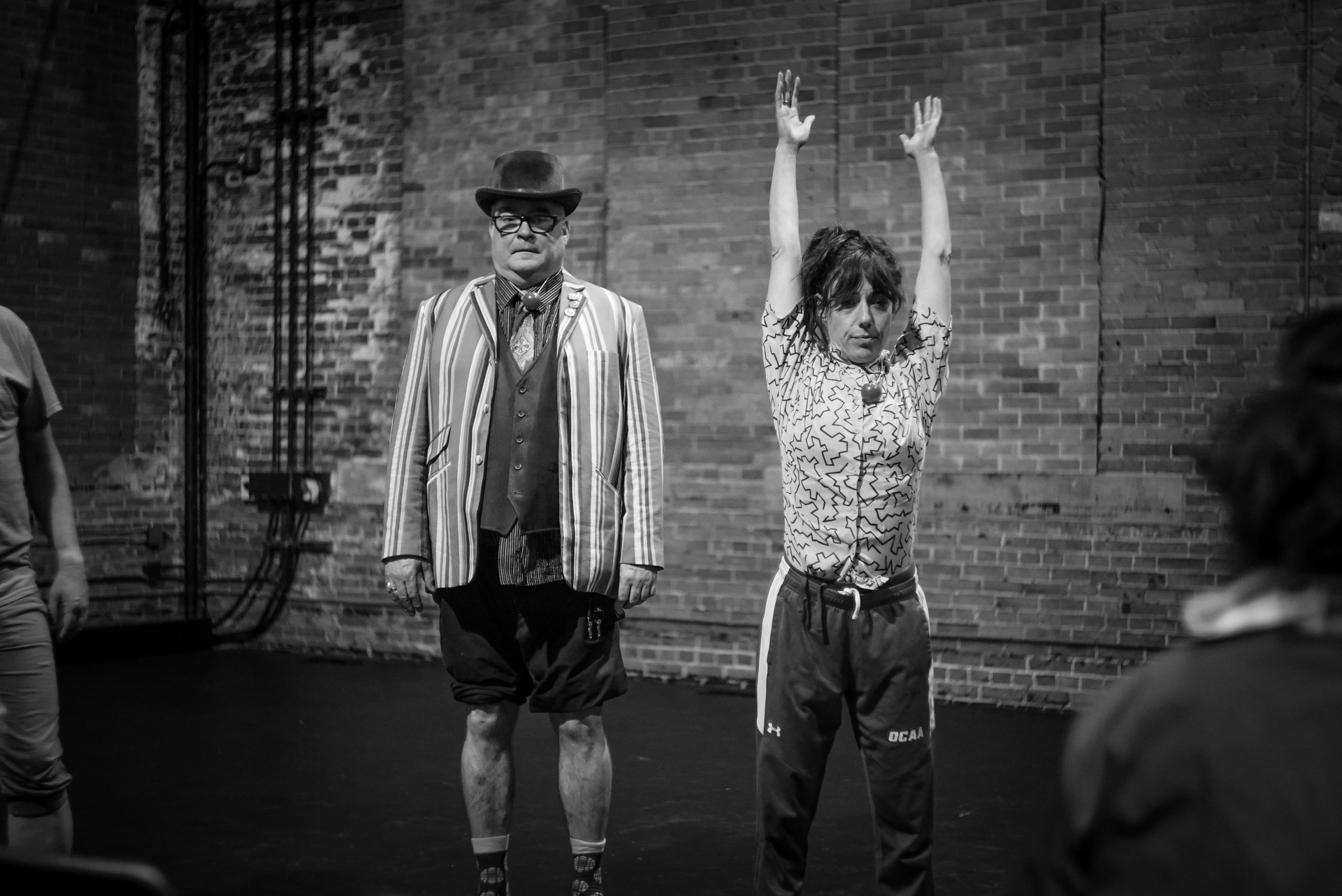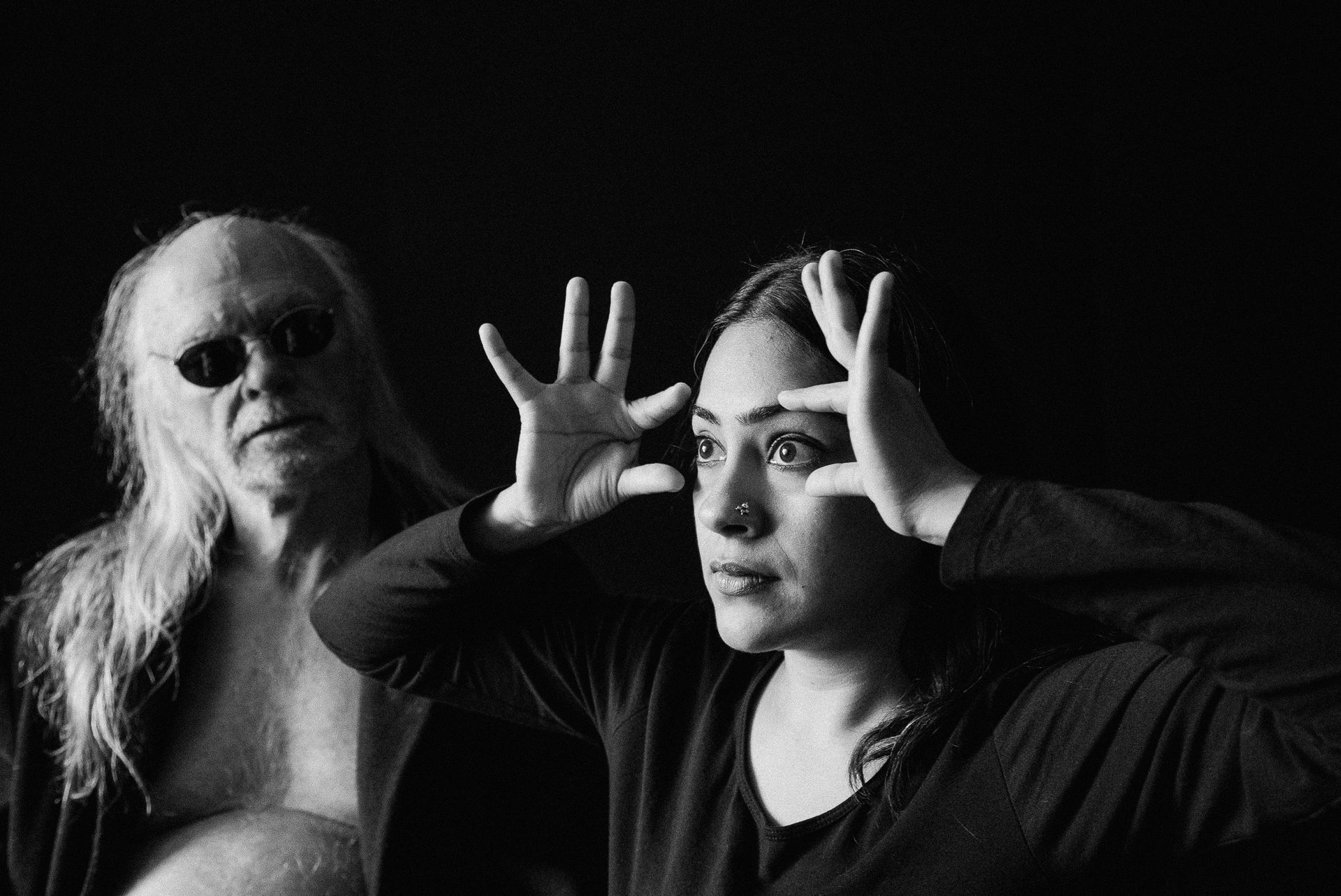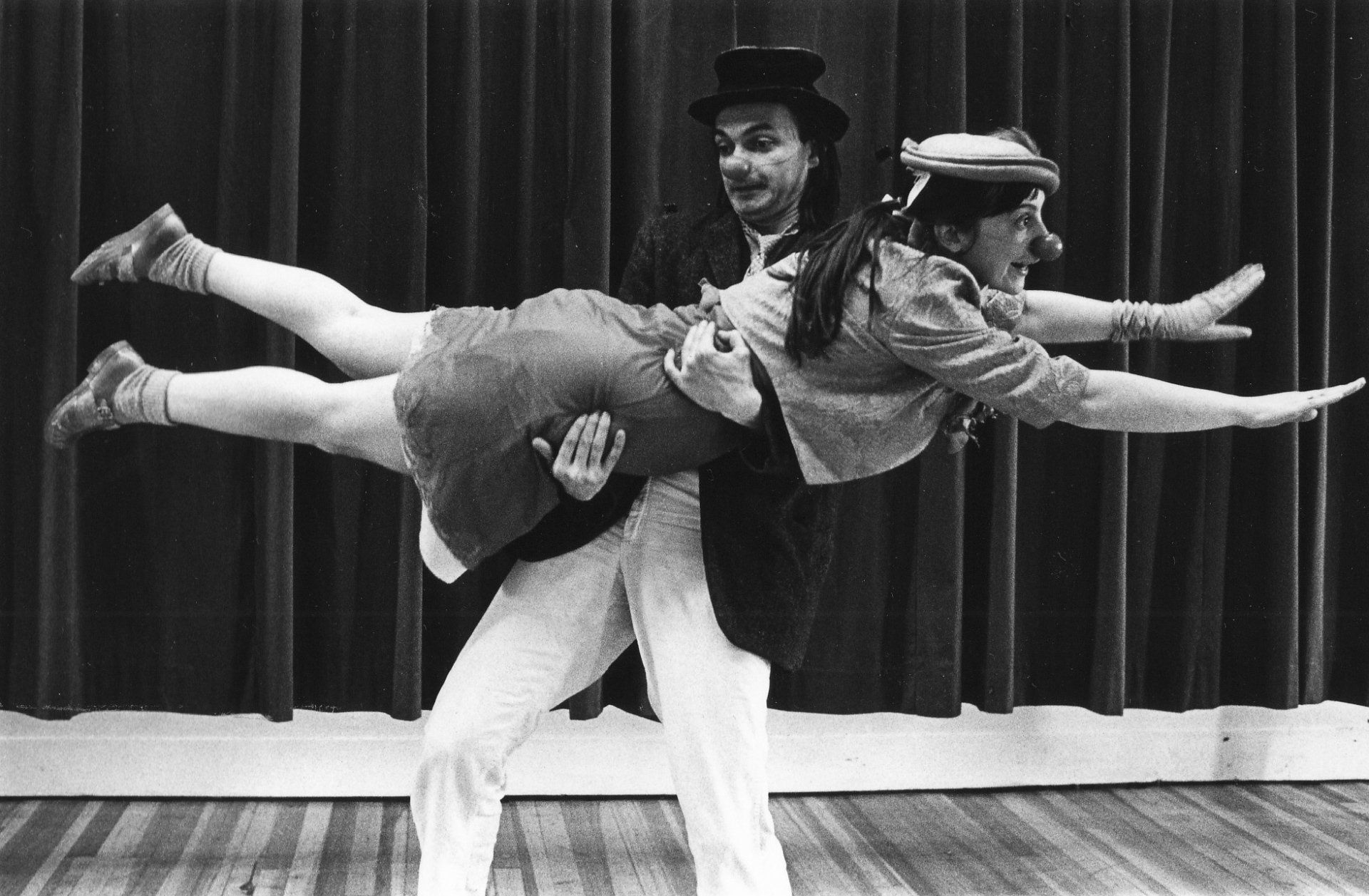Julian, Nina, Ben, Dan, and Daniel … on Creating AS I LAY DYING
How did you end up working on As I Lay Dying ?
 Benjamin Muir:
I had trained at Humber College under Dean Gilmour and worked on the Humber co-production Grimm
in my final year with Michele and Dean. I then assisted in rehearsal on Grimm Too
with Theatre Smith-Gilmour. I had continued to take workshops so, I guess, I was in mind when it came to them thinking of casting because they just asked me if I wanted to help adapt As I Lay Dying.
I hadn’t read it yet but I wouldn’t pass up working with them.
Benjamin Muir:
I had trained at Humber College under Dean Gilmour and worked on the Humber co-production Grimm
in my final year with Michele and Dean. I then assisted in rehearsal on Grimm Too
with Theatre Smith-Gilmour. I had continued to take workshops so, I guess, I was in mind when it came to them thinking of casting because they just asked me if I wanted to help adapt As I Lay Dying.
I hadn’t read it yet but I wouldn’t pass up working with them.
 Daniel Roberts:
I ran in to Julian on the street one day and I asked him what he was working on and he told me he was work shopping a new play with Theatre Smith-Gilmour. I guess he could feel the envy and excitement in my voice when I told him what a great opportunity that must be and how much I would love to work with the company. When the role of Vardaman came up he asked if I would like to audition for it. Of course I said yes and I was lucky enough to be chosen.
Daniel Roberts:
I ran in to Julian on the street one day and I asked him what he was working on and he told me he was work shopping a new play with Theatre Smith-Gilmour. I guess he could feel the envy and excitement in my voice when I told him what a great opportunity that must be and how much I would love to work with the company. When the role of Vardaman came up he asked if I would like to audition for it. Of course I said yes and I was lucky enough to be chosen.
Dan Watson: I have worked with Theatre Smith Gilmour on two shows inspired by Grimm Brother Tales, and was happy to receive an invitation to work on As I Lay Dying.
How did adapting such a famous work of literature impact the rehearsal process?
 Julian:
You definitely want to do it justice – the story, characters, dialogue, themes – everything is quite complex and not all spelled out so rehearsal was about discovering all the little nuances and bringing them to life. It’s iconic but it definitely has obstacles to being staged so you have to learn to be creative and solve some of those problems without worrying about being precious with the text.
Julian:
You definitely want to do it justice – the story, characters, dialogue, themes – everything is quite complex and not all spelled out so rehearsal was about discovering all the little nuances and bringing them to life. It’s iconic but it definitely has obstacles to being staged so you have to learn to be creative and solve some of those problems without worrying about being precious with the text.
 Nina:
The most challenging part of our rehearsal process was adapting the novel for the stage. Making a script out of this story line was a feat because the novel isn’t written in a linear way. We wanted to keep the poetry and the absurdity while making it linear for the audience. Another challenge dramaturgically was to tell each sibling’s story all the way through. The story is epic and full of details some we had to exclude and some we just couldn’t do without.
Nina:
The most challenging part of our rehearsal process was adapting the novel for the stage. Making a script out of this story line was a feat because the novel isn’t written in a linear way. We wanted to keep the poetry and the absurdity while making it linear for the audience. Another challenge dramaturgically was to tell each sibling’s story all the way through. The story is epic and full of details some we had to exclude and some we just couldn’t do without.
 Ben:
Staying true to Faulkner was always a priority and I think we were all very conscious of when it started get away from us. When that happened we would all go back to the text and read over the sections and confer with each other to make sure we all understood where the story was going. Then, as adaptation goes, there were certain things that were beautiful in literature that just didn’t translate or didn’t help move the story forward on stage the same way it did in the novel. It was never a small thing when changes were made.
Ben:
Staying true to Faulkner was always a priority and I think we were all very conscious of when it started get away from us. When that happened we would all go back to the text and read over the sections and confer with each other to make sure we all understood where the story was going. Then, as adaptation goes, there were certain things that were beautiful in literature that just didn’t translate or didn’t help move the story forward on stage the same way it did in the novel. It was never a small thing when changes were made.
 Daniel:
It helped the rehearsal process immensely because you had the novel to fall back on for ideas, direction and guidance. We tried to stay as close to the book as possible and keep Faulkner’s words. People who love theatre will love the show for its design, story telling, and action. People who love Faulkner will be equally impressed I think with how much and how accurately we transferred the novel into live action.
Daniel:
It helped the rehearsal process immensely because you had the novel to fall back on for ideas, direction and guidance. We tried to stay as close to the book as possible and keep Faulkner’s words. People who love theatre will love the show for its design, story telling, and action. People who love Faulkner will be equally impressed I think with how much and how accurately we transferred the novel into live action.
 Dan:
When I tell people about the project, lots of people say it’s one of their favourite books, lots say they have trouble reading Faulkner, and lots of people have never read the book, and have only a notion of who William Faulkner is. Many have a preconceived notion of the story, and many don’t, so we actually have a lot of room to play, and not as much pressure as I expected to live up to the book. I think seeing Faulkner’s writing on stage will make his novels much more accessible for a lot of people, particularly younger people.
Dan:
When I tell people about the project, lots of people say it’s one of their favourite books, lots say they have trouble reading Faulkner, and lots of people have never read the book, and have only a notion of who William Faulkner is. Many have a preconceived notion of the story, and many don’t, so we actually have a lot of room to play, and not as much pressure as I expected to live up to the book. I think seeing Faulkner’s writing on stage will make his novels much more accessible for a lot of people, particularly younger people.
What do you think makes this story still relevant today?
 Julian:
We all think about death and more importantly have experience with it whether it’s peripherally or intimately. The story is also shrouded in familiarity because you will recognize some of your own family dynamics in it but Faulkner has a way of making it the telling of it unique, and of a particular time and place.
Julian:
We all think about death and more importantly have experience with it whether it’s peripherally or intimately. The story is also shrouded in familiarity because you will recognize some of your own family dynamics in it but Faulkner has a way of making it the telling of it unique, and of a particular time and place.
 Nina:
We sit there laughing at how grotesque Anse Bundren is and these poor children who are essentially victims of his selfishness but we relate on some level. It is so over the top yet we have all met a Bundren in our life. The type of people who make all the wrong decisions, who hide behind morals and then manage to get everyone around them to pick up all the broken pieces.
Nina:
We sit there laughing at how grotesque Anse Bundren is and these poor children who are essentially victims of his selfishness but we relate on some level. It is so over the top yet we have all met a Bundren in our life. The type of people who make all the wrong decisions, who hide behind morals and then manage to get everyone around them to pick up all the broken pieces.
 Ben:
There is still deceit. There are governments dragging their people through wars and financial crises with politicians saying one thing and doing another and often at the end of it coming out unscathed and on top. While the citizens are either lost or trying to recover. There still exists harsh judgement and lack of communication among people. And lack of acceptance and justification for hatred all due to lack of proper, non-hostile, communication. Those are some things in the book that I believe are still issues and will be for a long time.
Ben:
There is still deceit. There are governments dragging their people through wars and financial crises with politicians saying one thing and doing another and often at the end of it coming out unscathed and on top. While the citizens are either lost or trying to recover. There still exists harsh judgement and lack of communication among people. And lack of acceptance and justification for hatred all due to lack of proper, non-hostile, communication. Those are some things in the book that I believe are still issues and will be for a long time.
 Dan:
I think there is something very North American about this story. Maybe it’s because I come from a small town, but I really connect with the characters’ relationships to the land. Nature is immense, beautiful and cruel, and the characters are constantly in conflict with it, but their attitude is that it is surmountable. I think this is a very North American mentality: kind of a stubborn courage. We challenge nature, or forces outside of ourselves, when better sense says we shouldn’t, and I think that is one of the things that makes the story gripping and timeless.
Dan:
I think there is something very North American about this story. Maybe it’s because I come from a small town, but I really connect with the characters’ relationships to the land. Nature is immense, beautiful and cruel, and the characters are constantly in conflict with it, but their attitude is that it is surmountable. I think this is a very North American mentality: kind of a stubborn courage. We challenge nature, or forces outside of ourselves, when better sense says we shouldn’t, and I think that is one of the things that makes the story gripping and timeless.
See Julian, Nina, Ben, Daniel, and Dan in As I Lay Dying , April 19-29, Theatre Centre
Tickets are only $15 – click here for ticket info.






